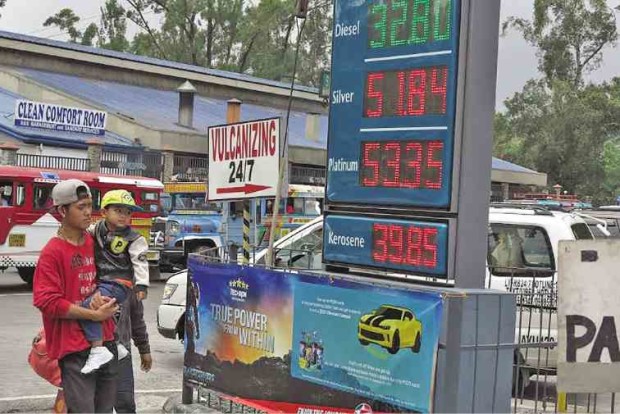Planning a trip to Baguio CITY? Gas up in lowlands

FILL ’ER UP Fuel prices are higher by an average of P14 per liter in Baguio City, forcing some visitors to gas up in nearby provinces like Pangasinan and La Union. —EV ESPIRITU
URDANETA CITY—If you are traveling on your own vehicle to Baguio City, make sure you have enough fuel to take you down to the lowlands to refuel in Pangasinan or La Union province.
This is because prices of petroleum products, except for diesel, are higher by at least P14 for every liter in the summer capital.
Based on the May 18 price monitoring data of the Department of Energy (DOE) Luzon field office here, premium gasoline prices in Baguio City ranged from P51.19 to P52.70 a liter, while unleaded fuel could be bought from P50.93 to P51.19 a liter.
These were much higher than the prices in key areas in the Ilocos and Central Luzon regions.
Cheaper than Baguio
Article continues after this advertisementIn the Ilocos, for instance, Dagupan City sold the cheapest premium gasoline at P37.70 a liter while Laoag City sold it at P45.04 a liter.
Article continues after this advertisementThe prices were still P7.66 to P15 a liter cheaper than premium fuel sold in Baguio City.
Diesel fuel, which sold in Baguio at P32.20 a liter, was P2.46 to P6.8 a liter more expensive than the P25.40 to P29.74 a liter in the Ilocos region.
Romulo Callangan Jr., acting director of the DOE Luzon field office, said the price disparity was due to the oil industry deregulation mandated by Republic Act (RA) No. 8479 or the Downstream Oil Industry Deregulation Act of 1998.
“It’s sad because we can never dictate the price. At the end of the day, because of deregulation, we are just left to check on the quantity and quality [of the oil products being sold],” he said.
RA 8479 allows market forces to dictate the prices of fuel sold in the country.
Section 2 of the law states: “It shall be the policy of the state to liberalize and deregulate the downstream oil industry in order to ensure a truly competitive market under a regime of fair prices, adequate and continuous supply of environmentally clean and high-quality petroleum products. To this end, the state shall promote and encourage the entry of new participants in the downstream oil industry and introduce adequate measures to ensure the attainment of these goals.”
According to Callangan, the DOE is aware of the big difference in prices of petroleum products sold in Baguio City and in the lowlands.
But even in lowland provinces, there is a disparity of prices, he said.
In Tarlac province, for instance, premium gasoline was sold at P37.91 a liter but in Guiguinto town in Bulacan province, it was sold at P48.48 a liter, which was higher by P10.57 a liter.
‘Price war’
“What we do is that when the price is unusually low, we check on it. They have complete documents and they have passed the quality check. So in a way, there’s a price war,” Callangan said.
“But at the end of the day, these are marketing strategies. If one lowers the price, hopefully, others will follow,” he said.
Despite limited manpower, the DOE sees to it that consumers are not shortchanged by ensuring that they get the right quantity and quality of the petroleum products that they buy, he said.
In Pangasinan, some gasoline stations have been fined P500,000 for certain violations, he said.
“We have been conducting information and education campaigns and we always involve local government units,” he said. “The DOE has no police power. We can only file administrative cases. But the revocation of business permits is in the hands of the local governments.”